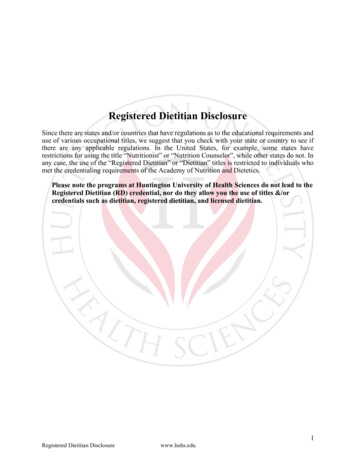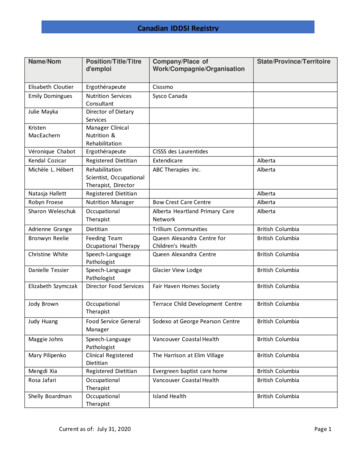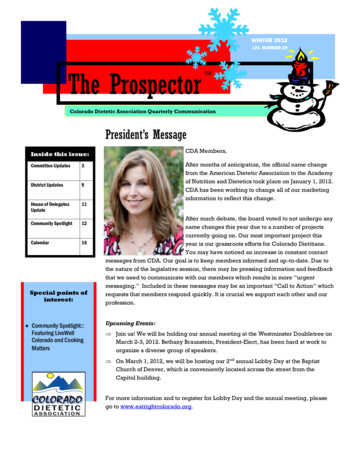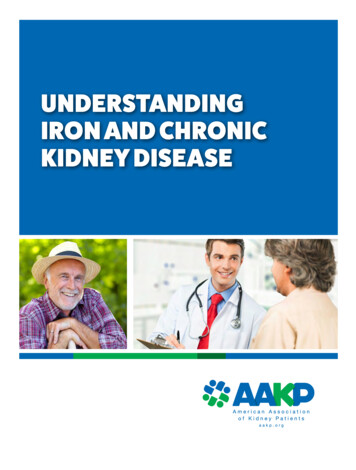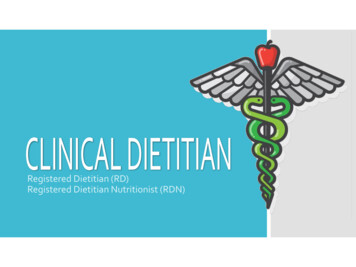
Transcription
Registered Dietitian (RD)Registered Dietitian Nutritionist (RDN)
Clinical dietitians are Registered Dietitians whospecialize in work in healthcare settings. The primary role of a clinical dietitian is to designnutrition programs to improve or maintain the healthof patients. A clinical dietitian is often at the center of theinteractions between doctor, patient, and the staff ofthe facility in which care is administered. Clinicaldietitians provide patient contact, counseling, andeducation to ensure patients’ needs are met.www.nutritioned.org/clinical-dietitian.html
Assess patients’ nutritional and health needs Counsel patients on nutrition issues and healthyeating habits Develop meal and nutrition plans, taking patients’preferences and budgets into account Promote better health by speaking to groups aboutdiet, nutrition, and the relationship between goodeating habits and preventing or managing diseases Create educational materials about healthy foodchoices Keep up with or contribute to the latest food andnutritional science research Document patients’ nutritionists.htm#tab-2
America’s First Dietitian, Sarah Tyson Rorer, was headof the influential Philadelphia Cooking School, a wellknown cookbook author, and a magazinepublisher. One of the first prominent cooks to beconcerned with health issues, Rorer educated herselfin chemistry, anatomy, and medicine. She workedwith doctors to develop special diets for the sick andmalnourished. Because of this work, she is oftenconsidered the first American dietitian. Rorer worked as an editor at The Ladies’ HomeJournal for over 14 years, where she wrote on cookingand health issues. This article is part of a series onhealthy eating. Even with her scientific background,Rorer was a product of her time; here, she dismissesstrawberries, oranges, and most other citrus fruits as“poisons,” warning that children and the infirm shouldnever eat them.Read Fruits as Foods and Fruits As Poisons: DomesticLessons: Number Six, by S.T. Rorerlibrary.missouri.edu/exhibits/food/rorer.html
Analytical Skills Dietitians must keep up to date with the latest food and nutrition research. They should interpretscientific studies and translate nutrition science into practical eating advice.Compassion Dietitians must be caring and empathetic when helping clients address health and dietary issuesand any related emotions.Listening Skills Dietitians must listen carefully to understand clients’ goals and concerns. They may work withother healthcare workers as part of a team to improve the health of a patient, and they need tolisten to team members when constructing eating plans.Organizational Skills Because there are many aspects to the work of dietitians, they should stay organized.Management dietitians, for example, must consider the nutritional needs of their clients, thecosts of meals, and access to food. Self-employed dietitians and nutritionists may need toschedule appointments, manage employees, bill insurance companies, and maintain patient files.Problem-solving Skills Dietitians must evaluate the health status of patients and determine the most appropriate foodchoices for a client to improve his or her overall health or manage a disease.Communication Skills Dietitians must explain complicated topics in a way that people with less technical knowledge canunderstand. They must clearly explain eating plans to clients and to other healthcareprofessionals involved in a patient’s ritionists.htm#tab-4
Dietitians and nutritionists held about 68,000 jobs in 2016. Thelargest employers of dietitians and nutritionists were as follows:30% Hospitals: state, local and private 60,210 average salary14% Government 57,910 average salary10% Outpatient Care Centers 65,650 average salary9% Nursing and Residential Care Facilities 57,020 average salary6% Self-Employed Workers Salary varieswww.nutritioned.org/clinical-dietitian.html
1. Accredited educational programDietitians complete an accredited program at thebachelor’s degree level or higher.2. Dietetic internshipDietitians participate in a hands-on internship for aminimum of 1200 supervised pre-professionalexperience hours.3. Dietetic licensure examDietitians pass an exam to qualify for licensure atthe state or national level.*Requirement vary by state.Learn more: www.nutritioned.org/state-requirements.html
Princeton students are most likely to pursue an entrylevel master’s degree in preparation for a career inclinical dietetics. Coordinated Programs in Dietetics incorporate thedietetic internship into the academic program. Didactic Programs in Dietetics provide the academicbackground for a dietetic career, and are followed byparticipation in the dietetic internship. Students should research individual programs tounderstand the nuances in specialties, electives, andother offerings to determine what program is right forthem.See the Academy of Nutrition and Dietetics for a completelist of accredited st/how-to-become-a-dietitian/
Johns Hopkins Bayview Medical Center MS in PublicHealth / Registered Dietitian Program University of Minnesota Public Health NutritionProgram University of North Carolina MPH / RegisteredDietitian Program University of Texas-Southwestern Medical CenterMaster of Clinical Nutrition – Registered DietitianProgram University of Washington Graduate CoordinatedProgram in Dietetics
Admission requirements Bachelor's degree in a nutrition- or science-related field (e.g.,nutrition, health, biology, chemistry)MSPH / RD HOPKINSSCHOOL OF PUBLIC HEALTH Graduate Record Examination (GRE) scores Personal statement Official transcripts from all institutions attended Three letters of recommendation Personal interviewPrerequisite courses Anatomy and physiology (two semesters) Organic chemistry Biochemistry Psychology and/or counseling skills Introductory NutritionStudents must meet the nutrition- or science-related degreerequirement in addition to pre-requisite course ian-program/
UT SOUTHWESTERNSCHOOL OF HEALTHPROFESSIONSFirst YearSecond YearFall 17 Credit HoursSpecial TopicsNutrition Care ProcessNutrition in Health PromotionFood Science and TechnologyNutrition in MetabolismProfessional DevelopmentNutrition Care Process PracticumFall 12 Credit HoursMedical Nutrition Therapy inPediatricsAdvanced Medical Nutrition TherapyPracticumEducation and Community NutritionPracticumFood Service PracticumSpring 16 Credit HoursMedical Nutrition Therapy in Chronic CareFood Service ManagementNutrition in Growth and DevelopmentSpecial TopicsHealth Care ResearchChronic Care Medical Nutrition TherapyPracticumSpring 13 Credit HoursNutrition in Media CommunicationsBusiness of Health CareIntegrated Nutrition PracticumSummer 9 Credit HoursMedical Nutrition Therapy in Acute CareNutrition in AgingAcute Care Medical Nutrition TherapyPracticumSummer 4 Credit HoursNutrition ResearchSpecial ion-coordinated-program/curriculum/
#NationalNutritionMonthCommon Questions AboutNational Nutrition MonthGet nutrition-month
Jessie, a registered dietitian and blogger shares a dayin her life working at a VA hospital:A Day in the Life of a Clinical Dietitian
Academy of Nutrition and Dietetics: EatRight.org Accreditation Council for Education in Nutrition andDietetics (ACEND): EatRightPro.org/ACEND NutritionED.org: NutritionED.org Commission on Dietetic Registration: CDRnet.org Board for Certification of Nutrition Specialists:NutritionSpecialists.org Today’s Dietitian: TodaysDietitian.com Center for Nutrition Advocacy: NutritionAdvocacy.org
2. Dietetic internship 3. Dietetic licensure exam Dietitians complete an accredited program at the bachelor's degree level or higher. Dietitians participate in a hands-on internship for a minimum of 1200 supervised pre-professional experience hours. Dietitians pass an exam to qualify for licensure at the state or national level.

